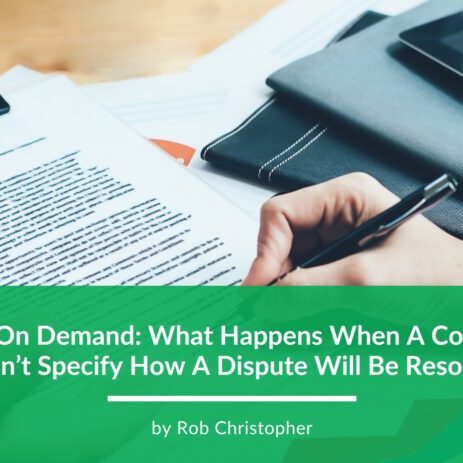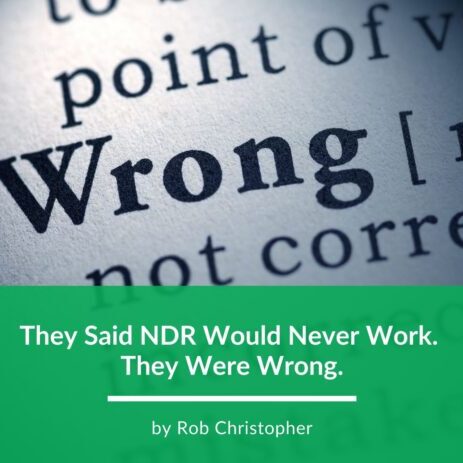Why Litigate: When would you WANT to choose litigation?

Why would you want to litigate? Previously, I wrote an article on reasons why you should avoid litigation. Now, I’ll take a look at the other side of the coin and discuss when litigation might be the more appropriate solution. People and companies end up in litigation for many reasons. Usually, someone – or, more likely, both parties – think they are right or they don’t see any other choice. Although this may be true, it does not offer any strategic insight into why a party might choose litigation to resolve a dispute. In my view, litigation may be the most strategic choice if you want to:
1. Set a precedent
You are right (or at least you think you are right) and you need to set a precedent the will preempt or discourage similar future claims, or send a particular message to others about you. Setting a precedent that you aren’t a pushover or will not be coerced into rolling over in a spurious dispute may be the most important reason for you to choose litigation.
2. Protect Your Intellectual Property
A company’s intellectual property can be its most important asset, and protecting it can be an essential part of your business. Litigation may be the only avenue to obtain protection that others will see and respect. However, litigating a patent can also be a double-edged sword if a patent is found to be invalid.
3. Resolve a Public Policy Issue
Issues of public policy are often impractical to address through legislation or other authoritative policy-setting methods, as both can move at a glacial pace or require huge budgets and expertise that is out of reach for most individuals and businesses. Sometimes you may have to resort to litigation to make your public policy point. For example, if an agency is looking at your treatment of employees and whether you give them adequate meal breaks or how you have classified workers as employees or contractors, you may want to litigate the issue rather than waiting for an agency decision. When pressed by others on such public policy issues, it can also make strategic sense to litigate the issue rather than conceding the issues, especially if the new policy will be harmful to your company.
4. Put a Competitor Out of Business
One cynical, but often-real reason to litigate may be to put a resource-strained competitor out of business. Setting aside the ethical implications and liability risks of doing so, this strategic choice can create sufficient leverage and distraction to force a company to change how they continue their business.
5. Require a Jury Decision
If you have an emotionally appealing story to tell, you may want a jury deciding your case. This is one of the most common strategic reasons to use litigation, often employed in personal injury or product liability or toxic/hazardous exposure and waste cases where illnesses and other medical problems are a result of company or industry behavior. Indeed, there are many types of cases in which a jury may be desireable.
These are a few of the reasons why litigation may be an appropriate choice to resolve a dispute. But it won’t come cheaply – in time, money or distraction from your business or life. Be sure the stakes are high enough to warrant it.
If the stakes don’t warrant litigation, then consider alternatives like neutral-driven dispute resolution (NDR).
This article was first published 11/3/2015 and has been updated.
More to read
NDR on Demand: What Happens When a Contract Doesn’t Specify How a Dispute Will Be Resolved?
The best way to deter threats of litigation and minimize the costs, duration, and distractions of resolving any dispute is to put a dispute resolution clause specifying NDR — Neutral-Driven Resolution — in all your contracts BEFORE there is a problem. That means that if a dispute should arise between a business and a contractor,…
They Said NDR Would Never Work. They Were Wrong.
Many people are surprised by how effective NDR can be. Since publishing my book and speaking at events about NDR (Neutral-Driven Resolution), I’ve often been asked a simple question: Does it work? And if it really does lower the costs and the time it takes to settle common disputes, why doesn’t everybody know about…
“Morgan Hill author releases new book”
The Morgan Hill Times featured Rob’s new book in an article ahead of his “Meet the Author” night at Booksmart. “Legal disputes and conflicts cost businesses billions of dollars a year in lawyers’ fees, lost productivity, time and aggravation. A new book by Morgan Hill author Robert Christopher proposes an innovative, faster and simpler way…
Not All Disputes are Equal
Not all business and legal disputes are alike, and not all of them can be resolved in the same way. In writing my book Just Right: How Neutral-Driven Resolution Can Close the Gap in American Civil Justice, it was important to distinguish the types of common disputes for which NDR is most suitable. As readers…



